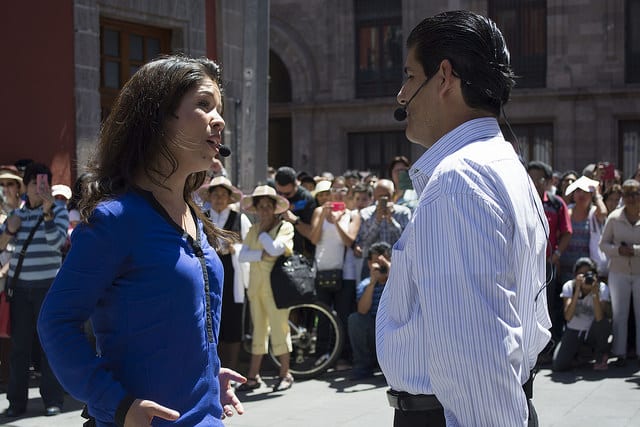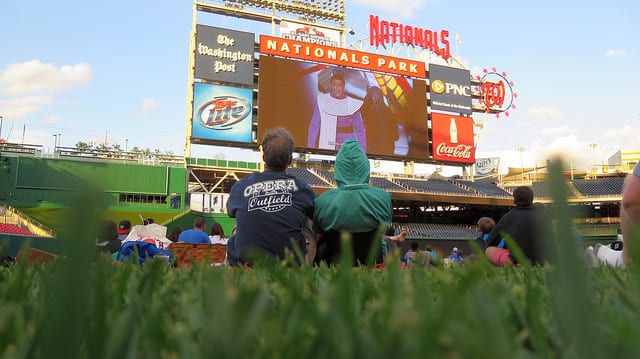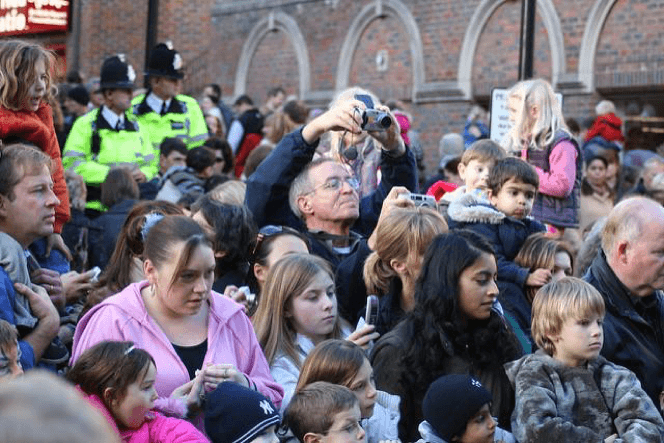Public Diplomacy is a tool that is needed more than ever in the current digital age, where the abundance of information makes it increasingly difficult to have one’s voice heard. Time brings about change and public diplomacy officials have been and are continuing to adapt to the changing environment that we are in. However, these officials need to look no farther than the field of opera, where the approach of attracting and maintaining an audience is drastically different than 50 years ago..
Every year there are a multitude of articles posted about how opera in the United States is a dying art form. From the cost of attendance to the ‘elite’ nature of the music, many believe that opera is on its way out. However, the artistic directors and executive directors of opera companies don’t want to see their industry die. They have begun to innovate and are attempting to reach out to different demographics that other directors have previously neglected. Their creative solutions can and should be used by other industries to constantly bring in new “people to the seats”. Here are five ways that public diplomacy officials can learn from opera companies.
- Spontaneity

(Eliud Pacheco/ Secretaría de Cultura Creative Commons)
The power of surprise is one that Opera Philadelphia heavily relies on. They constantly bring their art to audiences without the people suspecting or immediately recognizing what is happening. “Flash Mobs” started in the dance world but Opera Philadelphia uses this concept to introduce people to their art form and their upcoming season. The company goes into tourist areas in Philadelphia and performs a famous opera aria (song) which consistently delights the crowd. (You can see a video of it here.) By using spontaneity in a creative way, public diplomacy officials can brighten someone’s day but also give them information about the United States. An example could be bringing in a food truck to a busy tourist street and offering free food from the truck. The truck as well as the food wrapping could have facts about the United States on it. Thus, the action is spontaneous and interactive and potential consumers do not feel as if they are being beat over the head with information.
- Change the Venue

(Mrs. Gemstone Creative Commons)
Opera Companies are quickly learning that young people are not interested in sitting in a stuffy theater for two hours. Instead, during the summer and fall months, companies have begun to live cast an opera in a popular public place. Washington National Opera live casts an opera in Nationals Park as a part of their Opera in the Outfield program. The Metropolitan Opera puts on Opera in the Park. Companies that don’t have access to an outdoor venue have begun to even change the theater venue of their performances. San Francisco Opera has introduced the concept of an Opera Lab where there is a relaxed atmosphere and the hall even has a bar. Public Diplomacy officials are at a great advantage because their programming does not have to be limited to a single location. Have a talk on the beach. Sponsor a karaoke night at a bar. Offering a lighter atmosphere where foreign nationals can engage in the culture of the United States increases the opportunity of having a large crowd.
- Use the Culture of the Country You Are In
A constant international criticism of the United States is that “It is All America, All the Time.” Public Diplomacy officials must be able to tap into the cultural values of the country they are stationed in. Opera Companies are recognizing that as well and attempting to use the neighborhood they are based in to draw in a unique audience. In the United States, there is a sizable Hispanic population. Lyric Opera of Chicago sees this and implemented a program to attempt to attract Hispanics as consumers of their good. Their program showcased the connection between mariachi music and opera in a Hispanic neighborhood. With the sphere of the influence of the United States being ever reaching, diplomatic officials should have no problem identifying an area in their stationed country and putting on a program to highlight the connection of values between that country and the United States.
- Visuals! Visuals! Visuals!
English National Opera, based out of London, is the best opera company when it comes to changing their visuals. Research has shown that a captivating image can draw in a consumer to the message. Once that visual is made, it must be displayed on all available platforms that public diplomacy officials have available to them. This includes on social media and mobile sites. When the English National Opera introduced this concept, the average age of their customer dropped from 55 to 30. Embassies need to invest more in graphic designers because sometimes all it takes is one image to get someone previously not interested in your message to join you.
- Remember the Youth
To continue to combat terrorist ideology, diplomatic officials are going to need youth engagement. For opera companies to continue, they are going to need young people to fall in love with the art form. Young people buying in is the key to the success of any brand. Opera companies are letting young people ‘buy in’ by making them the content creators. The Royal Opera encouraged young people to design a mobile game that centered on the plot of an opera. They even commissioned a young composer to write a fanfare that played when patrons walked up to the theater. Even if embassies don’t want to use young people directly, they can allow a space for them when putting together programs targeted at their parents. Vienna State Opera pitched tents for children and in the tents, they performed scaled-down operas. If embassies were to have children-friendly areas, these spaces could have coloring books dedicated to United States foreign policy and toys that when pressed could issue a fact about the US’ foreign policy.

(Rachel Andrew Creative Commons)
Public Diplomacy officials must be creative in how they attract new consumers to their message. Various United States’ embassies abroad have started to recognize the power of flash mobs with Armenia and Belize as good examples. People love to be entertained and watch spectacles.
In thinking about events, it is important to take an all-inclusive mindset to programming. Instead of giving a speech in an auditorium to celebrate Earth Day, members of the U.S. Embassy in Sarajevo volunteered and cleaned up trails in a park. Not only did the Embassy have a program outside, they also showcased cooperation in working with the people of Bosnia and Herzegovina to clean up their national park.
By continuing to use 21st century strategies similar to opera companies, embassies can begin to see an immediate shift in who their message reaches.
Caveat: The views expressed in this blog are the author’s own and do not necessarily reflect those of the Institute for Public Diplomacy and Global Communication or the George Washington University.

This article brought to light the importance of incorporating the arts into Public Diplomacy programing. This blog post from TakeFive expands on this concept by using Smithsonian museums, as opposed to opera, as a way to reach their audience through art in another way: https://takefiveblog.org/2012/10/21/partnering-with-the-smithsonian-seriously-amazing/
I think this blog does a great job on trying to show how Opera companies have started to become effective in reaching new populations – however, their efforts haven’t stopped public opinion from thinking that opera and the arts are “dying”. I wonder if opera companies have been able to do enough to not just entice new audiences, but shift public opinion – and if public diplomacies officials can do the same with controversial policies.
This piece is so unique! It really takes a whole new perspective of Public Diplomacy. The work illustrates that Public Diplomacy needs creativity to survive and to thrive. Without bringing a new perspective, PD will fail internationally.
This article draws seamless parallels between opera and public diplomacy while being engaging and well written, and that was a fun experience for a reader who never realized such parallels could exist. The suggestions made throughout this article are innovative and realistic and give great options for new ways to engage people in the future Music is a powerful tool- maybe there’s even a way to use opera itself as public diplomacy!
I really love this idea! Music can not only be a cultural bridge but also an education tool. (As you likely already know) music can be an important stimulant for brain growth in young children. Stressing music as an education tool may help make opera and other classical music initiates more appealing to PD officers. Additionally, your ideas of changing the setting or brining opera straight to the public seem like really smart, viable ways to change public perception of an historically elite art form. Here’s the article for some more context: http://www.natureworldnews.com/articles/13417/20150313/listening-to-classical-music-good-for-the-brain.htm
You highlight such a great and unique opportunity to use music to connect cultures and influence life in a way people don’t typically encounter. The USC Center on Public Diplomacy also found many ways that music can influence public diplomacy. http://uscpublicdiplomacy.org/story/10-great-moments-music-diplomacy Unfortunately, they don’t incorporate any opera, but after reading this article, maybe they should?
I found your article extremely insightful and refreshing. It presents a unique perspective on public diplomacy that I think can often be overlooked. I would encourage you to pass it along to the Art & Diplomacy Foundation (http://artanddiplomacy.com/), I think it right in line with their interests. I was intrigued to see that there is potential for growth in opera audiences, and the diplomatic route is undoubtedly an extraordinary way to promote its growth and foster cross cultural understanding.
Anthony, this blog is incredibly creative and is flawlessly articulated. When I was in high school I had the opportunity to play the clarinet at the Milan Conservatory, it was a Tuesday night spontaneous concert that brought people of all ages in attendance. You are correct in asserting that the spontaneity element makes people feel like they are not being “beat over the head with information”. I wonder how U.S. safety and security priorities can also be pushed in similar fashions? For instance, here is the link to the new American Airline’s safety video in which they use a ‘flash mob’ environment: https://www.youtube.com/watch?v=LXb28mVZiJo
I was one of those people that believed that Opera was a dying art form before reading your blog, but now I have learned that not only is it still a vibrant form of artistic expression, but it can be used to as an informative tool in conducting PD operations abroad! I particularly found your emphasis on spontaneity to be refreshing, as I typically think of embassy operations as orderly and planned out. Similarly, this article over “dance diplomacy” shows how the arts can be used in the PD sphere: https://pdgc2015d.wordpress.com/2016/02/09/dance-diplomacy-spreading-culture-without-words/